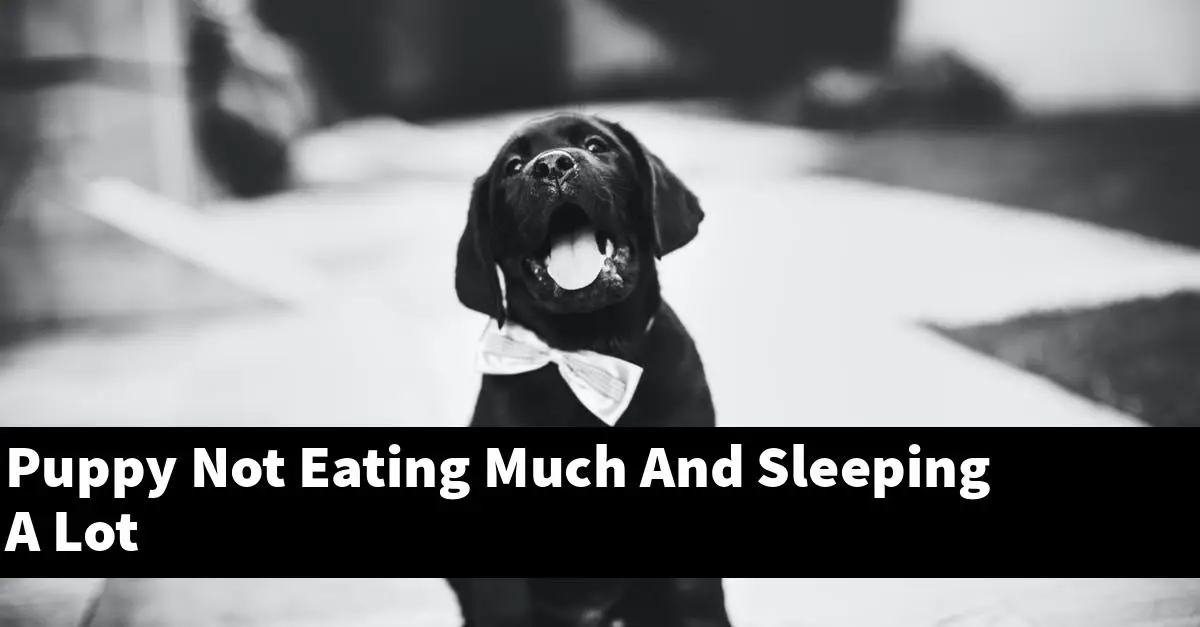There could be many reasons why a puppy is not eating much and sleeping a lot. It could be that the puppy is sick, it could be that the puppy is not getting enough exercise, or it could be that the puppy is not getting enough food. If the puppy is not eating much and sleeping a lot, it is important to take the puppy to the vet to find out what is wrong.
The article is going to be covering why the puppy is not eating much and sleeping a lot.
Table of Contents
What might be causing my puppy to not eat much and sleep a lot?
One possible reason for a puppy not to eat much and sleep a lot is that the puppy is not feeling well. It is possible that the puppy is coming down with an illness or is not feeling well for some other reason. If the puppy is not eating and is sleeping a lot, it is important to take the puppy to the vet to have it checked out. Another possible reason for a puppy to not eat much and sleep a lot is that the puppy is not getting enough exercise. Puppies need a lot of exercise, and if they are not getting enough, they may become lethargic and not want to eat. If a puppy is not eating and is sleeping a lot, it is important to make sure that the puppy is getting enough exercise.
Is it normal for puppies to sleep a lot?
Yes, it is normal for puppies to sleep a lot. Puppies need a lot of sleep because they are growing and their bodies are developing. Puppies typically sleep for 18 to 20 hours a day.
How can I get my puppy to eat more?
There are a few things you can do to encourage your puppy to eat more. One is to make sure they are eating at the correct time. Puppies need to eat more frequently than adults, so make sure they are getting enough food throughout the day. You can also try different types of food. Some puppies prefer wet food while others prefer dry food. You can also try different brands of food to see if your puppy prefers one over the other. Lastly, make sure your puppy has access to fresh water at all times.
What are some possible health concerns if my puppy isn’t eating much?
If your puppy is not eating much, it is important to take him to the vet to rule out any possible health concerns. Some health concerns that could be causing your puppy to not eat much include:
1. Infection: If your puppy is not eating much and is also lethargic and has a fever, he may have an infection. Infections can be caused by bacteria, viruses, or parasites and can be serious if not treated.
2. Intestinal blockage: If your puppy is not eating and is also vomiting and has diarrhea, he may have an intestinal blockage. Intestinal blockages can be caused by swallowed objects, tumors, or inflammation of the intestines and can be very serious if not treated.
3. Pancreatitis: If your puppy is not eating and is also vomiting and has a fever, he may have pancreatitis. Pancreatitis is inflammation of the pancreas and can be very serious if not treated.
4. Kidney disease: If your puppy is not eating and is also drinking a lot of water and urinating a lot, he may have kidney disease. Kidney disease can be caused by many things and can be very serious if not treated.
5. Liver disease: If your puppy is not eating and is also vomiting and has a yellowish tint to his skin or eyes, he may have liver disease. Liver disease can be caused by many things and can be very serious if not treated.
If your puppy is not eating much, it is important to take him to the vet so that any possible health concerns can be ruled out.
Should I be worried if my puppy isn’t eating much?
If you are concerned that your puppy is not eating enough, it is important to first assess whether or not they are drinking enough water. Puppies can become dehydrated very easily, so it is important to make sure that they are staying hydrated. If your puppy is not drinking enough water, they will likely be lethargic and have a dry nose. If you are concerned that your puppy is not drinking enough water, you should take them to the vet to be sure.
If your puppy is drinking enough water, the next thing to assess is whether or not they are urinating regularly. Puppies can become constipated if they are not eating enough, so it is important to make sure that they are urinating regularly. If your puppy is not urinating regularly, they will likely be lethargic and have a dry nose. If you are concerned that your puppy is not urinating regularly, you should take them to the vet to be sure.
If your puppy is drinking enough water and urinating regularly, the next thing to assess is whether or not they are gaining weight. Puppies need to gain weight in order to grow and develop properly. If your puppy is not gaining weight, they will likely be lethargic and have a dry nose. If you are concerned that your puppy is not gaining weight, you should take them to the vet to be sure.
What are the signs of fading puppy syndrome?
Puppies are born with a natural immunity to disease, which is passed on from their mother through her colostrum. This immunity starts to fade at around 6-8 weeks of age, and by 12 weeks it is generally considered to be completely gone. This is why puppies need to be vaccinated at around 6-8 weeks of age, and again at 12 weeks.
Fading puppy syndrome is a condition that can occur when a puppy’s immunity fades too quickly. It is most commonly seen in puppies that are born by Caesarean section, or that are orphaned and do not have access to their mother’s colostrum. Puppies with fading puppy syndrome are more susceptible to infections and diseases, and can often die from them.
The most common signs of fading puppy syndrome are weight loss, lethargy, diarrhea, vomiting, and a decreased appetite. If you see any of these signs in your puppy, it is important to take them to the vet immediately. Early diagnosis and treatment is essential for the best chance of survival.
Is it normal for a puppy to not want to eat?
It’s normal for puppies to not want to eat for a variety of reasons. They may be teething, which can cause discomfort and make eating less appealing. They may be experiencing stomach upsets due to changes in their diet or environment. Or they may simply be too distracted by all the new sights and smells around them to focus on food.
If your puppy is not eating, it’s important to consult with your veterinarian to rule out any medical causes. Once any health concerns are ruled out, you can work on increasing your puppy’s appetite by making mealtimes more enjoyable. Try feeding smaller meals more often, offering a variety of different foods, and making sure there’s plenty of time for your puppy to eat without being interrupted. With a little patience and effort, you should be able to get your puppy eating regularly in no time.
Is my puppy sick or just tired?
If your puppy is lethargic, has a loss of appetite, is vomiting, or has diarrhea, they may be sick and you should take them to the vet. If your puppy is just tired, they may need more sleep or a nap. If they are napping more than usual, or seem to be tired all the time, it may be a good idea to take them to the vet to rule out any health problems.
Summary
– If your puppy is not eating much and sleeping a lot, it is important to take the puppy to the vet to find out what is wrong.


